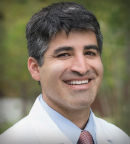
Laurie H. Sehn, MD, MPH

Alex Herrera, MD
Laurie H. Sehn, MD, MPH, Clinical Professor with the BC Cancer Centre for Lymphoid Cancer and University of British Columbia, Vancouver, Canada, and Alex Herrera, MD, Associate Professor in Hematology and Hematopoietic Cell Transplantation at the Beckman Research Institute of City of Hope, Duarte, California, agreed that ZUMA-7, which evaluated axicabtagene ciloleucel,1 and the similar phase III TRANSFORM trial, which looked at lisocabtagene maraleucel,2 were practice-changing for the second-line treatment of relapsed or refractory large B-cell lymphoma. “The findings are so far in favor of CAR [chimeric antigen receptor] T-cell therapy that I think it’s inevitable this approach will become the standard of care,” said Dr. Sehn, who moderated a press briefing where both studies were presented. She called the findings “remarkable, exciting, and transformative.”
Although the studies yielded nearly identical improvements in event-free survival (hazard ratios of 0.398 for ZUMA-7 and 0.349 for TRANSFORM), the study designs, populations, and products were different. Therefore, Dr. Herrera emphasized, the studies cannot be directly compared.
One noteworthy difference is the use of bridging chemotherapy—which was allowed in TRANSFORM but not in ZUMA-7. Dr. Sehn pointed out that the risk in not allowing chemotherapy is the potential for selection bias, since clinicians may not enroll patients with aggressive, more rapidly progressing disease, who need immediate treatment. Having data from TRANSFORM as well, she said, is important. “The fact that there are two trials with these two different designs provides reassurance that the benefit is consistent,” Dr. Sehn commented.
Issues Yet to Be Settled
However, with CAR T-cell therapy apparently moving into the second line for high-risk patients, questions remain, noted Dr. Sehn and Dr. Herrera:
- What will be the optimal treatment of transplant-eligible patients who are not at high risk?
- Will salvage chemotherapy and stem cell transplantation be safe and effective as a third-line or later therapy?
For patients with primary refractory or early-relapsed aggressive disease who need urgent treatment and receive bridging chemotherapy, which strategy—CAR T-cell therapy or transplantation—will be the more effective consolidation approach?
Meanwhile, regardless of issues yet to be settled, Dr. Sehn concluded that the “profoundly improved outcomes” in patients with high-risk large B-cell lymphoma provide “compelling evidence” for using CAR T-cell therapies in the second line.
DISCLOSURE: Dr. Sehn has served as a consultant to Novartis, Genmab, Debiopharm, Teva, Roche/Genentech, AbbVie, Acerta, Amgen, Apobiologix, AstraZeneca, Celgene, Gilead, Incyte, Janssen, Kite, Karyopharm, Lundbeck, Merck, MorphoSys, Sandoz, Seattle Genetics, Takeda, TG Therapeutics, and Verastem. Dr. Herrera has served as a consultant to Tubulis, Karyopharm, Genentech, ADC Therapeutics, Merck, Seagen, Bristol Myers Squibb, AstraZeneca, and Takeda.
REFERENCES
1. Locke FL, Miklos DB, Jacobson C, et al: Primary analysis of ZUMA-7: A phase 3 randomized trial of axicabtagene ciloleucel versus standard-of-care therapy in patients with relapsed/refractory large B-cell lymphoma. 2021 ASH Annual Meeting and Exposition. Abstract 2. Presented December 12, 2021.
2. Kamdar M, Solomon SR, Arnason JE, et al: Lisocabtagene maraleucel, a CD19-directed chimeric antigen receptor CAR T cell therapy, versus standard of care with salvage chemotherapy followed by autologous stem cell transplantation as second-line treatment in patients with relapsed or refractory large B-cell lymphoma: Results from the randomized phase 3 TRANSFORM study. 2021 ASH Annual Meeting & Exposition. Abstract 91. Presented December 11, 2021.

